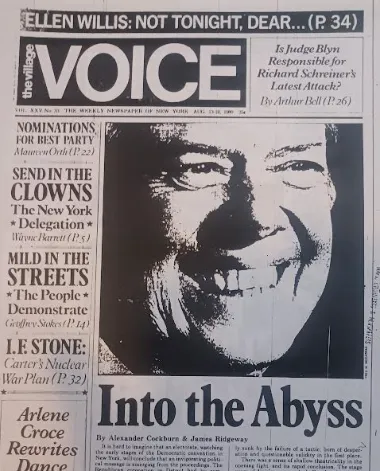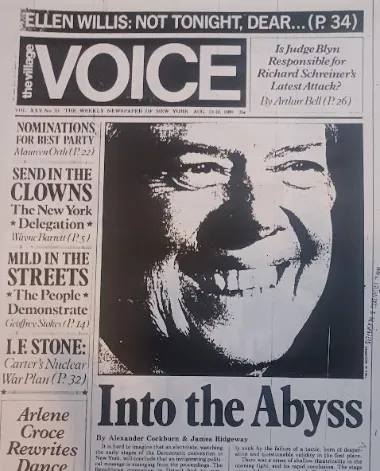
The Village Voice, April 13–19, 1980
A Response to Mike Johnson
I read Mike Johnson’s article Choosing Our Opponent: Why I will work to elect Joe Biden in the Stansbury Forum with a mixture of curiosity and concern. Not because I find it surprising that he is going to campaign for Biden’s reelection, but because he reaches back to the Carter presidency to find what he perceives as the U.S. Left’s failure in 1980 then and what needs to be done now. Johnson wrote:
“For me, it helps to go back to 1980, when much of the Left argued against supporting Jimmy Carter’s re-election race against Ronald Reagan, a position which I believe in retrospect was wrong.”
As someone who came of age in post-Vietnam America, the Carter years were a big part of my political life. I was sixteen when Jimmy Carter was elected president in 1976. I came from a blue-collar, working class family in Massachusetts, whose hearts really were with the Kennedy’s, despite Chappaquiddick, yet, both of my parents voted for Carter. My Mother, however, had an innate distrust of Southern Democrats (Carter was from Georgia), and my father once cracked, “Don’t trust anybody that smiles that much,” referring to Carter’s trademark smile.
By the time I started college in the fall of 1978, Carter’s presidency had already taken a sharp right turn. It got a lot worse. Soon after the Russian invasion of Afghanistan in December 1979, Carter reinstituted the registration for the draft (military conscription) and I was a member of the first generation of young men that had to register since the end of the Vietnam War. My first national demonstration, in fact, was against the draft in Washington, D.C., while he was still president on a cold, windy day in March 1980.
I write all of this because I know the Carter years really well, so I’m perplexed at why Johnson needs to have a public recantation four decades later of the position that his group the League of Revolutionary Struggle (LRS) took way back then. While he is not naïve about Carter’s record in office — he gives a long list of Carter’s failures but surprisingly omits many others, especially the Iranian hostage crisis — he appears to miss the big point: the Carter presidency was a transitional regime between the many decades of the Democratic Party domination of national politics since the New Deal to the Republican Party since 1980.
All the key political issues that we identify with the Reagan era, especially deregulation of major industries, including trucking, finance, and the airlines and the attacks on the labor movement, had devastating consequences for workers in what had been up-until-then densely unionized industries. When I was writing my book The Package King: A Rank and File History of UPS, I was genuinely shocked to discover the boasting of Carter’s inflation “Czar” Alfred Kahn, a self-described “good liberal democrat” and the former chairman of the Department of Economics at Cornell University, about making the lives of unionized workers worse: He wrote:
“I’d love the Teamsters to be worse off. I’d love the automobile workers to be worse off. I want to eliminate a situation in which certain protected workers in industries insulated from competition can increase their wages much more rapidly than the average.”
Mike Johnson recognizes that many leading labor figures hated Carter, including Machinist President William Winpisinger and AFL-CIO President Lane Kirkland, yet Kirkland endorsed and campaigned for Carter. In one of my favorite interviews with Winpisinger, Village Voice journalists Alexander Cockburn and James Ridgeway asked:
“Is there any way the President [Jimmy Carter] can redeem himself in your eyes?”
“Yes, there’s one way he can do it.”
“What’s that?”
“Die.”
“So, he’s totally unacceptable as President?’
“I have said so countless times. I don’t intend to relent. He’s unfit to run this goddamn country. He was elected on the crest of the wave of Truth Sayers, and that son of bitch had lied through his fucking teeth every day he’s been there. It’s quite clear he marches to the drum beat of the corporate state.”
Winpisinger went in a different direction than Kirkland and a majority of the leaders of U.S. unions in 1980. He led a walkout of three hundred delegates at the 1980 Democratic Convention to protest Carter’s nomination, and later endorsed radical environmentalist Barry Commoner for President. For the president of a union heavily invested in the U.S. War Machine was pretty gutsy stuff. But, Winpisinger later failed monumentality when he refused to call on his members to honor the picket lines of striking air traffic controllers in 1981, with the devastating consequences that followed.
While I was going through my old Carter file, I found it interesting that so much of what I kept from those years was from the lefty — liberal, iconoclastic Village Voice, secondarily the New York Times, and, lastly a sprinkling of article from the Old Left newspaper the Guardian, which remind how wide and deep the hatred of Carter was. I joined the International Socialist Organization (ISO) soon after I went to college at UMass-Boston and remained a member until 2018. Our newspaper Socialist Worker took the right position then — “No Choice in the 1980 Elections” — and I would defend it now.
I would suggest to Mike Johnson to go back to the 1976 presidential election and recall what Michael Harrington argued then. Harrington was the future leader of the Democratic Socialists of America, and probably still the best known socialist in the United States because of his book The Other America. In an exchange with Jacobin publisher Bhaskar Sunkara in 2013 on the legacy of Michael Harrington, I wrote:
Whatever doubts might have lingered for me about the question [voting for the “lesser evil”] were cleared up by a debate between Harrington and Peter Camejo during the 1976 presidential election campaign, when Camejo was running as the presidential candidate of the Socialist Workers Party.
I read the transcript of the debate when it was published by Pathfinder Press several years after it took place. Harrington and Camejo were both in top form. Harrington was subtle and nuanced. But I thought Camejo, arguing for the importance of socialists remaining independent of the two capitalist parties in the U.S., won the debate.
I wasn’t surprised by Harrington’s pitch for a “lesser evil” vote for Jimmy Carter over the incumbent and unelected Republican President Gerald Ford, but I was struck by one particular point. Harrington said, “The conditions of a Carter victory are the conditions for working class militancy, and the militancy of minority groups, and the militancy of women, and the militancy of the democratic reform movement. We can actually begin to make victories on full employment, national health and issues like that.”
I knew from my own experience of the Carter years that none of this happened — the mass movements didn’t advance because of a Democratic victory. And if we replace Carter with Mondale, Dukakis, Clinton, Gore, Kerry or Obama, can we say any different? This strategic “engagement” urged by Harrington weakened the left terribly during the post-Vietnam war era.
So, when Johnson writes that we should “pick our opponent” and campaign for Biden, I’m reminded that whatever you want to call that strategy, it is a road to nowhere.





